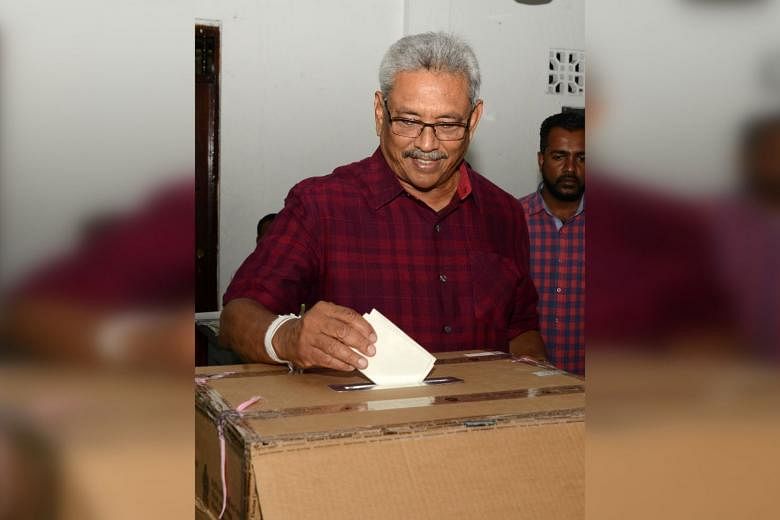COLOMBO (REUTERS) - Sri Lanka's election commission declared former defence secretary Gotabaya Rajapaksa as the winner of the presidential election on Sunday (Nov 17).
Rajapaksa won 52.25 per cent of the votes, while his main rival and government minister Sajith Premadasa received 41.99 per cent, the election commission said.
Premadasa had already conceded defeat.
Rajapaksa oversaw the military defeat of Tamil separatists under his brother and then president Mahinda Rajapaksa 10 years ago. He has promised strong leadership to secure the island of 22 million people, the majority of whom are Sinhalese Buddhists.
Rajapaksa, 70, would be the latest nationalist leader swept to power across the world, tapping into the anger and fears of majority communities. He and his brothers, who are expected to get key positions, are also seen as closer to China, which has invested billions of dollars building ports, expressways and power stations. But these projects have also led to high debt levels for Sri Lanka.
In his first comments, Rajapaksa struck a conciliatory note, suggesting he would be a leader of all Sri Lankans, regardless of their ethnic and religious identities. "As we usher in a new journey for Sri Lanka, we must remember that all Sri Lankans are part of this journey. Let us rejoice peacefully, with dignity and discipline in the same manner in which we campaigned," Rajapaksa said in a tweet.
Tamil political parties are strongly opposed to Rajapaksa, who has faced allegations of widespread human rights violations of civilians in the final stages of the war against the separatists in 2009. Rajapaksa and his brother deny the allegations.
Muslims, the other large minority group, say they too have faced hostility since the April attacks on hotels and churches in which more than 250 people were killed. Islamic State claimed responsibility.
With half the votes counted from Saturday's election, Rajapaksa led with 50.7 per cent, while his main rival Sajith Premadasa had 43.8 per cent, the election commission said.
Premadasa concedes defeat
Premadasa, a housing minister in the current government that has faced criticism for failing to protect Sri Lankans in the wake of the suicide bombings in April, conceded defeat.
"At the conclusion of a hard fought and spirited election campaign, It is my privilege to honour the decision of the people and congratulate Mr. Gotabaya Rajapaksa on his election as the seventh President of Sri Lanka," Premadasa said.
Millions voted to elect a new president to lead the country out of its deepest economic slump in over 15 years, dragged down by its tourism sector following the bombings.
His victory margin showed huge support in the Sinhalese-dominated southern parts of the island.
Premadasa, who campaigned on policies to help the poor, led in the north and east where minority Tamils are predominant.
He urged Rajapaksa to ensure he took all Sri Lankans along and not target those who opposed him in the election.
"I also urge Mr. Rajapaksa to ensure that the post-election environment is peaceful, and that no citizen or New Democratic Party supporter is persecuted or harmed for their role in supporting my candidacy," he said, referring to his party.
Elections Commissioner Mahinda Deshapriya said the voter turnout across the island could be as much as 84 per cent.
Gunmen opened fire and pelted stones at a convoy of about 20 buses transporting "hundreds" of Muslim voters in north-west Sri Lanka in the early hours of Saturday, said Mr Manjula Gajanayake, national coordinator for the privately run Centre for Monitoring Election Violence.
"The reason for the shooting incident is definitely political elements trying to prevent voting," Mr Gajanayake said, adding that the victims, who escaped unhurt, had been able to exercise their franchise.
The winner of Sri Lanka's election will inherit a country with an economy where growth has slowed to a more than five-year low of 1.6 per cent in the quarter ended June, and which has a debt level hovering at 83 per cent of gross domestic product.
"If Gotabhaya wins he will improve the country," said Ms Manel Perera, 68, a housewife in the Kotte area of the capital. "Otherwise the country will go down further."
Mr Rajive Premathilake, 54, a business executive who said he voted for Mr Premadasa, said the next government needs to ensure "democracy, freedom and civil liberties while getting the economy going. It can't be one at the expense of the other".
Investors had taken a wait-and-see approach ahead of the elections, said Mr Adrian Perera, chief operating officer at Equicapital Investments in Colombo. The benchmark stock index has risen 16 per cent in the past six months, making it one of the 10 best-performing equity markets globally.
"If Gotabhaya wins, there maybe a speculative rally, on expectations he will set up a new government," Mr Perera said. "But for long-term investments to come in, we need to see parliamentary elections concluded and the fiscal budget presented."

